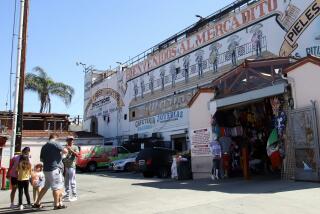Labors of Love : Honoree: Even while engaged in organizing activities, travel and work, John Handcox continued to write music and poetry.
SAN DIEGO — Like many of the people who come to live in San Diego, John L. Handcox was drawn to this area in 1942 by its agreeable climate. But when the then-38-year-old decided to settle here in 1942, he was also running from a situation that few San Diegans ever face. Six years earlier, Handcox had escaped Arkansas one step ahead of a lynch mob.
Handcox’s offenses were many. In 1935, the impoverished tenant farmer began writing songs and poems about the injustices visited upon his people by the plantation owners. He decried the overcharging of farmers at the plantation stores--a practice that kept them perennially indebted--and encouraged the farmers to ask for receipts for their purchases. He railed against the slavish working conditions that had men and women working long hours for 50 cents a day and then returning to ramshackle homes to sleep on cotton sacks stuffed with straw.
Worst of all, Handcox organized local chapters of the newly formed Southern Tenant Farmers Union, encouraging tenant farmers, sharecroppers and day laborers to picket for their rights, and then giving them strength by singing to them as they marched. Handcox riled the lieutenants of racism and oppression and received word that a rope had his name on it.
Handcox left home and traveled the land before settling in war-mobilized San Diego, where he peddled eggs, fish and fruit from a truck, ran a restaurant and grocery store, worked as a carpenter and continued to write songs and poetry. Since then, many of his earliest songs--”Roll the Union On,” “Mean Things Happenin’ in This Land,” “Raggedy Raggedy Are We”--have become staples of folk and labor song fests all over the world.
In the mid-’80s, Pete Seeger--who had been introduced to those tunes by his songwriting companion and singing mate in the Weavers, Lee Hays--heard that Handcox was still alive and helped get him onto the bills of folk festivals, union gatherings and other events.
A tribute to Hancock tonight will see several aspects of his life and work come full circle. A year after escaping Arkansas, he visited Washington, D.C., where a musicologist recorded his songs onto an aluminum disk for the Library of Congress. The musicologist was Charles Louis Seeger, Pete’s father.
Many of the early labor broadsides were adapted from Negro spirituals and gospel tunes, and Pete Seeger later would say that Handcox’s music represented the perfect blending of gospel and folk. It’s fitting, then, that in addition to the many folk artists and community speakers featured in tonight’s program, all four choirs from Handcox’s own church in Southeast San Diego will perform.
More to Read
Sign up for Essential California
The most important California stories and recommendations in your inbox every morning.
You may occasionally receive promotional content from the Los Angeles Times.










